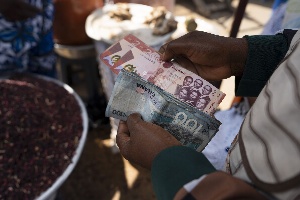- Home - News
- Elections 2024
- News Archive
- Crime & Punishment
- Politics
- Regional
- Editorial
- Health
- Ghanaians Abroad
- Tabloid
- Africa
- Religion
- Photo Archives
- Press Release
General News of Friday, 9 May 2025
Source: www.ghanawebbers.com
Ghana’s foreign currency issuer credit rating upgraded from ‘SD’ to ‘CCC+’
S&P Global Ratings has upgraded Ghana’s foreign currency issuer credit rating. It moved from ‘SD’ (Selective Default) to ‘CCC+’. This upgrade reflects progress in debt restructuring and a better economic outlook.
The rating agency announced this change after key phases of the domestic debt exchange program. Negotiations with external creditors are also ongoing. They affirmed their ‘CCC+’ issue ratings on Ghana's debt.
Additionally, they confirmed the ‘CCC+/C’ long- and short-term local currency ratings. The outlook for both foreign and local currency ratings is stable. Ghana’s transferability and convertibility assessment remains at ‘CCC+’.
The upgraded rating is supported by stronger external indicators. There has been a significant rise in gold export earnings. Foreign exchange reserves are steadily increasing as well.
This indicates improved liquidity and capacity to meet near-term obligations. The restructuring of commercial debt is nearing completion too. Following the successful Eurobond exchange in October 2024, the new rating reflects Ghana’s improving creditworthiness.
This upgrade follows successful local currency and Eurobond restructurings. A memorandum of understanding with bilateral creditors was signed on January 29, 2025.
However, S&P warns that Ghana's credit rating may face downward pressure soon. If fiscal performance worsens or financing conditions tighten, risks could increase. High debt servicing costs may further strain the government's ability to refinance upcoming debts.
While some lenders might become holdout creditors, disruption seems unlikely. This is due to principles under the G20 Common Framework and advanced stages of the process.
Currently, fiscal reforms aim to address economic vulnerabilities amid structural challenges. Inflation remains high at 21.2% but is trending downwards now.
The cedi has strengthened against other currencies, trading around GH¢14 now. Finance Minister Dr. Cassiel Ato Forson assures these gains reflect sound economic policies.
He credits robust fiscal planning and targeted actions for restoring macroeconomic confidence.











